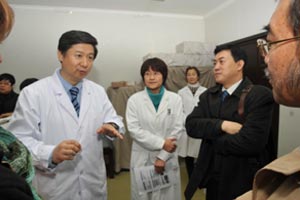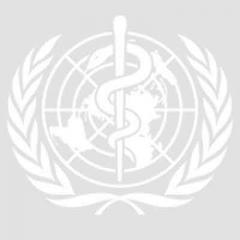Your progress
0%
Here are some of the key ideas you need to understand in order to ensure that people with disabilities and their families receive the medical care that they need and are entitled to.
Use your mouse or keyboard to expand each of the headings below.
Many health systems have three levels of health care: primary, secondary and tertiary. These are usually linked by a referral system. While there is often overlap between each level, it is important for CBR personnel to understand the basic differences between them to facilitate access for people with disabilities and their family members.

Medical personnel may refer people with disabilities to rehabilitation services for general medical care, instead of treating them at primary health care facilities. This is because they are not aware that, like the general population, people with disabilities may acquire a general health condition at any stage in their life, for which they will need medical care. For example, medical care may be needed for respiratory infections, influenza, high blood pressure, middle-ear infections, diabetes, tuberculosis or malaria.
Health-care personnel have an important role to play in the early identification of conditions that can lead to impairments. It is important that all health conditions are identified and treated early (secondary prevention). Some health conditions, if left untreated or uncontrolled, can lead to new impairments or exacerbate existing impairments. Early intervention is less traumatic, is cost-effective and produces better outcomes.
Many people with disabilities also have specific, short- or long-term medical care needs – for example, people with epilepsy or mental health problems may require drug regimens over a long period of time. Some people with disabilities may also require surgery to address their impairments.
Surgery is part of medical care and is usually provided at the secondary or tertiary levels of the health-care system. Some types of surgery can improve function and limit deformities and complications that may be associated with impairments. Examples of surgery include:
There are many things to consider before surgery is undertaken:
It is important to remember that surgery alone cannot address all problems that may be related to impairments.
Self-management or self-care management does not mean managing your health without medical intervention. Instead, it means that people take control of their own health, are responsible for making informed choices and decisions about medical care and play an active role in carrying out care plans to improve and maintain their health.
Self-management requires a good relationship between individuals and their health-care personnel to ensure that good health outcomes are achieved. People who self-manage their care must be able to:
Self-management is important for people who experience a lifelong disability, such as paraplegia, or a chronic condition such as diabetes.
Self-help groups can provide a good opportunity for people with disabilities to learn about self-management through the sharing of knowledge and skills with others.
Learn the results of a research study that attempted to determine whether people could learn self-management skills by participating in a group made up of others with the same condition.


The Italian association Amici di Raoul Follereau (AIFO/Italy) together with the Disability and Rehabilitation team at the World Health Organization and Disabled People International, carried out research across several countries to determine whether people could learn self-management skills and play a more active role in improving their own medical care if they got together as a group of people with disabilities with similar medical care needs.
Pilot projects were asked to:
A pilot project in El Salvador focused on spinal cord injury. AIFO/Italy, in partnership with Don Bosco University and Instituto Salvadoreno Para La Riabilitacion de Invalidos, worked with 30 people with spinal cord injuries and their families from the areas of San Salvador and the village of Tonacatepeque. Four self-help groups were formed and regular meetings were held. Members of these groups identified their major medical care needs which included:
Health professionals involved in the project provided self-management skills training to address the issues that had been identified. Over time, members of the self-help groups and health professionals involved in the project began to change their thinking. They realized that with proper support and training, people with spinal cord injury could manage their health and achieve a better quality of life. They also realized that health professionals needed to look beyond their traditional medical roles and facilitate and promote self-management care – a concept of shared responsibility. Members of the self-help groups went on to form their own association called ALMES (Asociacion de Personas con Lesion Medular de El Salvador).